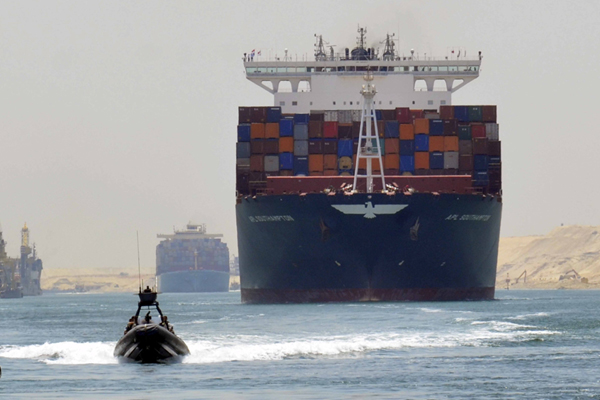The economic map of Egypt has changed with the Third Republic, whose features have appeared through a number of major projects, starting tomorrow with the opening of the New Suez Canal project. It is expected following the arrival of large foreign investments, mainly of heavy industries in the canal’s axis.
However, the entry of these foreign investments requires filtering current laws and legislation, which includes enacting the one-stop-shop mechanism of the new investment law within 18 months. This would enable Egypt to reap the benefits of the success of the Egypt Economy Development Conference which was recently held in Sharm El Sheikh and included the signing of a number of major projects. The opening of the new canal is expected to contribute to doubling Egypt’s annual income in general and the canal in particular, from $ 5.3 billion to $ 13.2 billion, as well as the doubling of services provided to world trade, thanks to the increase in the number of ships to 97 daily.
The government should begin to take serious steps in the development of the canal axis and doubling its revenues by exploiting its strategic location. Egypt awaits the launching of three major projects, mainly the establishment of heavy industries, such as the car industry in the northern part of Sharq Al-Tafriaa in southeastern Port Said, as well as work-intensive industries in west of the Suez Canal, parallel to Ain El Sokhna Port, carried out by a group of Chinese investors. Also, agricultural projects which can be built in the east of the Ismailia, which can contribute to opening the door for the export of Egyptian products to world countries. In addition, developing the New Suez Canal ports will contribute to accommodating many major investment projects, similar to Jabal Ali in Dubai, as well as logistics services needed for transiting ships. These containerships used to head for Europe to be offered such services which were not found in the canal axis. Logistics areas are an important means of exporting products and providing thousands of new job opportunities as well as doubling revenue through dealing with all containers, raw materials and products that pass through the waterway of the canal, where logistics provide strong opportunities for recycling.
The Egyptian government is currently holding talks with a number of countries in the region to participate in the foundation of huge industries which can be absorbed by the canal development axis in the coming term, mainly the launching of plants for containers and ships. This will help introduce new types of technology with foreign investments that will train Egyptian labourers and contribute to the State’s benefiting from the passage of ships. The intelligence of the political leadership is reflected in organising the opening ceremony in the presence of world leaders to attract the attention of investors to Egypt. Businessmen and major foreign companies are studying the possibility of entering into new development axis projects, which requires the state to reconsider existing legislation for foreign investors and the mechanisms for the allocation of land, labour laws, taxes and other laws and items that need to be filtered again to conform with the state’s receiving of a tremendous amount of major investments in a variety of fields.
Quick investment revenues are expected after the opening and official operation of the canal, as compared to the economic conference held in Sharm al-Sheikh in March, which saw a review of the investment opportunities in the country in various sectors. The success of the conference, which yielded the signing of several contracts in various projects, should be witnessed by the end of the year.
The government has to complete revising laws and economic legislation, in particular, some of which may represent an obstacle to investors, and adopt strict measures to end red tape in government authorities, the complexity of labour laws and interests, as well as the elimination of favoritism and to start schemes for administrative reform, especially that the issuance of the New Investment Law is the first step toward bringing the state back on the right track. This can be done through the activation of the one-stop-shop mechanism, which will contribute to the elimination of the biggest crises of foreign investment in the country, including access to land, licenses, elimination of corruption and the unification of entities, which will deal with the investor. The results of activating the one-stop-shop mechanism will show within a year or two from now. The coming period will witness a massive flow of many projects and major investment opportunities, which will provide thousands of jobs and accommodate many investors. However, the prevailing belief among some local businessmen and investors that the State is directed to assign the work of the implementation of major projects for Arab investors and foreigners is a misconception in the first place. The government does not seek to marginalise the role of local investors in the development agenda.


